National Coverage Determination May Limit Access to AD Treatment
March 14th, 2022 by Global Down Syndrome Foundation
National Coverage Determination May Limit Access to AD Treatment
HealthPayerIntelligence | Mar 14, 2022
March 14th, 2022 by Global Down Syndrome Foundation
National Coverage Determination May Limit Access to AD Treatment
HealthPayerIntelligence | Mar 14, 2022
February 10th, 2022 by Wes Butler
How The Medical System Is Failing People With Down Syndrome And Alzheimer’s Disease
Forbes | Feb 10, 2022
April 17th, 2024 by Cole Wilkes
Self-advocates to Receive the Rosa DeLauro & Tom Cole Advancement Awards & Local Dancers with Down Syndrome Showcase Talents
Denver, CO, April 17, 2024 —
The Global Down Syndrome Foundation (GLOBAL) is honoring Congresswoman Lois Frankel (D-FL) and Congressman Richard Hudson (R-NC), who will receive the Quincy Jones Exceptional Advocacy Awards for their work in support for those with Down syndrome, during its annual AcceptAbility Gala. The gala is an inspiring fundraiser event taking place at the Marriott Marquis in Washington, DC on May 9th that features DC-area dancers who happen to have Down syndrome and other disabilities and a performance by Grammy-nominated, multi-platinum singer/songwriter and actress, Jordin Sparks.
“We are excited to highlight the extraordinary talents and gifts of people with Down syndrome at our AcceptAbility Gala. It’s also a chance to honor those Members of Congress who have worked hard to ensure our community benefits from federally funded research that is improving their lives,” says Michelle Sie Whitten, President & CEO, Global Down Syndrome Foundation. “This year, we are thrilled to honor Rep. Hudson and Rep. Frankel for their unwavering support for people with Down syndrome and their families, and to thank Representatives Cathy McMorris Rodgers and Rosa DeLauro, both of whom will be in attendance, for their life-changing leadership.”
GLOBAL’s annual AcceptAbility Gala brings together policymakers from both sides of the aisle, key scientists from NIH, and the Down syndrome community. With GLOBAL’s leadership bringing together multiple stakeholders, the NIH Down syndrome research and medical care budget has increased by $338 million over the last six years. The AcceptAbility Gala is an opportunity to celebrate major new federal research funding increases after years of being one of the least funded genetic conditions and to educate Congress and the community about the transformative DeOndra Dixon INCLUDE Project Act of 2024 that will elongate life and improve health outcomes for people with Down syndrome.
During the gala, GLOBAL will honor 2024 GLOBAL Ambassador Isla Eager and her family from Arlington, Virginia and present the Rosa DeLauro & Tom Cole GLOBAL Advancement Awards to two self-advocates with Down syndrome. The awards come with a $1,000 each scholarship for post-secondary education. The 2024 Gala Chairs are Julie Riccio, Director of Regulatory Affairs and Public Policy, PwC, and Amy Best Weiss, Executive VP, Global Government Affairs, American Express. Congressional Hosts include Sen. Bob Casey, Sen. John Hickenlooper, Sen. Jerry Moran, Cong. Robert Aderholt, Cong. Katherine Clark, Cong. Tom Cole, Cong. Rosa DeLauro, Cong. Cathy McMorris Rodgers, Cong. Eleanor Holmes Norton, Cong. Pete Sessions, and Cong. Pete Stauber. This year’s event has 89 Members of Congress supporting it as well as the Honorary Congressional Committee. The AcceptAbility Gala is co-emceed by husband and wife team—Fox News’ John Roberts and ABC’s Kyra Phillips.
Other leaders who are participating include Frank Stephens, GLOBAL board member, GLOBAL Ambassador, self-advocate and actor, from Fairfax, VA; David Egan, Quincy Jones Awardee, gala event committee, self-advocate and author, from Vienna, VA; Robert Wallop, soloist dancer and self-advocate, from Annapolis, MD; Jan Adams, Founder & CEO JMA Solutions; Cory Alexander, Strategic Advisor, UnitedHealth Group; John Ashbrook, Founding Partner, Cavalry LLC; Kevin Brennan, Principal, Bluebird Strategies; Natalie Farr Harrison, SVP Government Relations, Avoq; Erin Book Mullen, Principal, Williams & Jensen, PLLC, Ed Mullen, Partner, Narrative Strategies; Matthew Perin, Head of Government Relations and Regulatory Affairs, Kroger; Cliff Riccio, Senior Vice President & Chief, Government Relations, NCTA; and Salo Zelermyer, Vice President for Federal Affairs and Counsel, Valero; and Dr. Joaquín Espinosa, Executive Director, Linda Crnic Institute for Down Syndrome.
The AcceptAbility Gala supports the Global Down Syndrome Foundation, funding life-changing research and lifesaving medical care for children and adults with Down syndrome. Down syndrome is the most frequent chromosomal condition, affecting an estimated 400,000 Americans, but it has been one of the least-funded genetic condition by NIH. GLOBAL is focused on raising funds to support research, educating the public about the discrepancy in research funding, and showcasing the abilities of those with Down syndrome. It is the largest US non-profit working to save lives and dramatically improve health outcomes for people with Down syndrome.
The AcceptAbility Gala starts at 6:00 p.m. with a reception and red carpet followed by dinner, a live auction, and performances by local individuals with Down syndrome and Jordin Sparks. Tickets start at $500 and can be purchased online at www.globaldownsyndrome.org. To cover the event or receive photos or b-roll, contact Shawn Flaherty at 703-554-3609. For more information, visit www.globaldownsyndrome.org.
###
About the Global Down Syndrome Foundation
The Global Down Syndrome Foundation (GLOBAL) is the largest non-profit in the U.S. working to save lives and dramatically improve health outcomes for people with Down syndrome. GLOBAL has donated more than $32 million to establish the first Down syndrome research institute supporting over 400 scientists and over 2,400 patients with Down syndrome from 33 states and 10 countries. Working closely with Congress and the National Institutes of Health, GLOBAL is the lead advocacy organization in the U.S. for Down syndrome research and medical care. GLOBAL has a membership of over 110 Down syndrome organizations worldwide and is part of a network of Affiliates – the Crnic Institute for Down Syndrome, the Sie Center for Down Syndrome, and the University of Colorado Alzheimer’s and Cognition Center – all on the Anschutz Medical Campus. GLOBAL’s widely circulated medical publications include GLOBAL Medical Care Guidelines for Adults with Down Syndrome, Prenatal & Newborn Down Syndrome Information, and the award-winning Down Syndrome World™ magazine. GLOBAL also organizes the annual AcceptAbility Gala in Washington DC, and the annual Be Beautiful Be Yourself Fashion Show, the largest Down syndrome fundraiser in the world.
April 8th, 2024 by Cole Wilkes
GLOBAL Quincy Jones Exceptional Advocacy Awardee and “Champions” Actress, Madison Tevlin, Delivers Another “Must See” Performance for World Down Syndrome Day
Denver, CO, Mar 27, 2024 — The Global Down Syndrome Foundation (GLOBAL) is proud to support the international awareness campaign video, “Assume That I Can,” that is taking the internet by storm! GLOBAL has financially sponsored and supported this annual campaign organized by CoorDown in Italy. This year’s campaign was created in collaboration with the New York-based agency SMALL.
The breakout star of the campaign video is “Champions” actress Madison Tevlin who received GLOBAL’s highest honor, the Quincy Jones Exceptional Advocacy Award in 2023. Madison and iconic film director Bobby Farrelly received their Quincy Jones Awards at the Be Beautiful Be Yourself Fashion Show, the largest fundraiser for people with Down syndrome in the world.
“We are so proud to be part of CoorDown’s annual awareness campaign video and to have Madison be the star of the film was just beyond perfect,” says Michelle Sie Whitten, GLOBAL President and CEO. “At GLOBAL we are working so hard to elongate life and improve health outcomes so we embrace this parallel theme of limiting perceptions. The video is exceptional, fantastic, wonderful – we hope it gets MILLIONS of views!”
World Down Syndrome Day falls on March 21st or “3-21” signifying the fact that people with Down syndrome are born with 3 (three) copies of chromosome 21 instead of 2 (two). World Down Syndrome Day was promulgated by the United Nations in 2012 and is celebrated in 190 countries.
To learn more about the Global Down Syndrome Foundation and World Down Syndrome Day, visit www.globaldownsyndrome.org/world-down-syndrome-day-month.
Hashtags: #AssumeThatICan #WDSD24 #WorldDownSyndromeDay #Endthestereotypes
#downsyndromerocks #dsrocks #downsyndromelove #downsyndromeawareness #t21 #globalrocks #downsyndromeworld #downsyndrome #nonprofit #denvernonprofit
About the Global Down Syndrome Foundation
The Global Down Syndrome Foundation (GLOBAL) is the largest non-profit in the U.S. working to save lives and dramatically improve health outcomes for people with Down syndrome. GLOBAL has donated more than $32 million to establish the first Down syndrome research institute supporting over 400 scientists and over 2,400 patients with Down syndrome from 33 states and 10 countries. Working closely with Congress and the National Institutes of Health, GLOBAL is the lead advocacy organization in the U.S. for Down syndrome research and medical care. GLOBAL has a membership of over 110 Down syndrome organizations worldwide and is part of a network of Affiliates – the Crnic Institute for Down Syndrome, the Sie Center for Down Syndrome, and the University of Colorado Alzheimer’s and Cognition Center – all on the Anschutz Medical Campus. GLOBAL’s widely circulated medical publications include GLOBAL Medical Care Guidelines for Adults with Down Syndrome, Prenatal & Newborn Down Syndrome Information, and the award-winning Down Syndrome World™ magazine. GLOBAL also organizes the annual AcceptAbility Gala in Washington DC, and the annual Be Beautiful Be Yourself Fashion Show, the largest Down syndrome fundraiser in the world.
March 30th, 2024 by Cole Wilkes
Honor DeOndra Dixon, The Video Catching Fire, AcceptAbility Gala is Coming, GLOBAL in the News and more – Your March Newsletter!
March 22nd, 2024 by Cole Wilkes
March 15th, 2024 by Cole Wilkes
March 14th, 2024 by Cole Wilkes
Self-Advocates with Down Syndrome Share Their Stories & Inspire the World
DENVER, NYC, SANTIAGO, KAMPALA, March 12, 2024 – Today, the Global Down Syndrome Foundation (GLOBAL) announced the official launch of their “21 for 21” Campaign that is being generously matched by the Safeway Foundation. GLOBAL’s goal is to raise $21,000 of which 100% of the proceeds will go to life-saving medical care for patients with Down syndrome from 33 states and 10 countries.
The campaign uses Phone2Action so that self-advocates with Down syndrome can create their own website pages with their photos and story that aim to inspire and help GLOBAL raise critical funds. Supporters can set up their pages here in three easy steps.
As World Down Syndrome Day approaches on March 21 (3/21), GLOBAL is gearing up for several initiatives that celebrate inclusivity, diversity and advocacy for people with Down syndrome all over the world:
“We are so honored to be a part of World Down Syndrome Day initiatives in the US, Chile, Uganda, and Italy this year,” says GLOBAL President & CEO Michelle Sie Whitten. “We are now actively working in 10 countries translating and distributing our Prenatal & Newborn Pamphlet, GLOBAL Adult Guideline, and other important resources at no cost to thousands of people with Down syndrome and their families.” We could not do this without our wonderful in-country collaborators, the leaders on our GLOBAL Membership Advisory Board, and our transformative affiliates, families and champions. Everyone at GLOBAL works so hard it is lovely to have a day where everyone can just celebrate the awesome people with Down syndrome we serve!”
World Down Syndrome Day falls on March 21st or “3-21” signifying the fact that people with Down syndrome are born with 3 (three) copies of chromosome 21 instead of 2 (two). World Down Syndrome Day was promulgated by the United Nations in 2012 and is celebrated in 190 countries.
To learn more about the Global Down Syndrome Foundation and World Down Syndrome Day, visit www.globaldownsyndrome.org/world-down-syndrome-day-month.
###
About the Global Down Syndrome Foundation
The Global Down Syndrome Foundation (GLOBAL) is the largest non-profit in the U.S. working to save lives and dramatically improve health outcomes for people with Down syndrome. GLOBAL has donated more than $32 million to establish the first Down syndrome research institute supporting over 400 scientists and over 2,400 patients with Down syndrome from 33 states and 10 countries. Working closely with Congress and the National Institutes of Health, GLOBAL is the lead advocacy organization in the U.S. for Down syndrome research and medical care. GLOBAL has a membership of over 110 Down syndrome organizations worldwide and is part of a network of Affiliates – the Crnic Institute for Down Syndrome, the Sie Center for Down Syndrome, and the University of Colorado Alzheimer’s and Cognition Center – all on the Anschutz Medical Campus. GLOBAL’s widely circulated medical publications include GLOBAL Medical Care Guidelines for Adults with Down Syndrome, Prenatal & Newborn Down Syndrome Information, and the award-winning Down Syndrome World™ magazine. GLOBAL also organizes the annual AcceptAbility Gala in Washington DC, and the annual Be Beautiful Be Yourself Fashion Show, the largest Down syndrome fundraiser in the world.
March 13th, 2024 by Cole Wilkes
March 12th, 2024 by Cole Wilkes
The Energy & Commerce Health Subcommittee Favorably Reported the DeOndra Dixon INCLUDE Project Act of 2024 with Unanimous Support
DENVER – March 12, 2024—The Global Down Syndrome Foundation (GLOBAL) praised the House Energy and Commerce Health Subcommittee for approving the DeOndra Dixon INCLUDE Project Act of 2024 (H.R. 7406), which would authorize the INvestigation of Co-occurring conditions across the Lifespan to Understand Down syndromE (INCLUDE) Project at the National Institutes of Health (NIH).
The legislation will formally authorize a trans-NIH structure to ensure that major crosscutting issues and opportunities within Down syndrome research are identified and allow for multiple institutes to collaborate on a research plan. This will enable institute coordination to plan, fund, and share and disseminate research results that aim to improve health outcomes for those with Down syndrome.
GLOBAL is deeply grateful to their congressional champions who are co-sponsoring this important legislation: Representative Cathy McMorris Rodgers (R-WA) who formally introduced the game-changing DeOndra Dixon INCLUDE Project Act of 2024 with her colleagues Diana DeGette (D-CO), Tom Cole (R-OK), Rosa DeLauro (D-CT), Pete Stauber (R-MN) and Delegate Eleanor Norton Homes (D-DC) as original cosponsors.
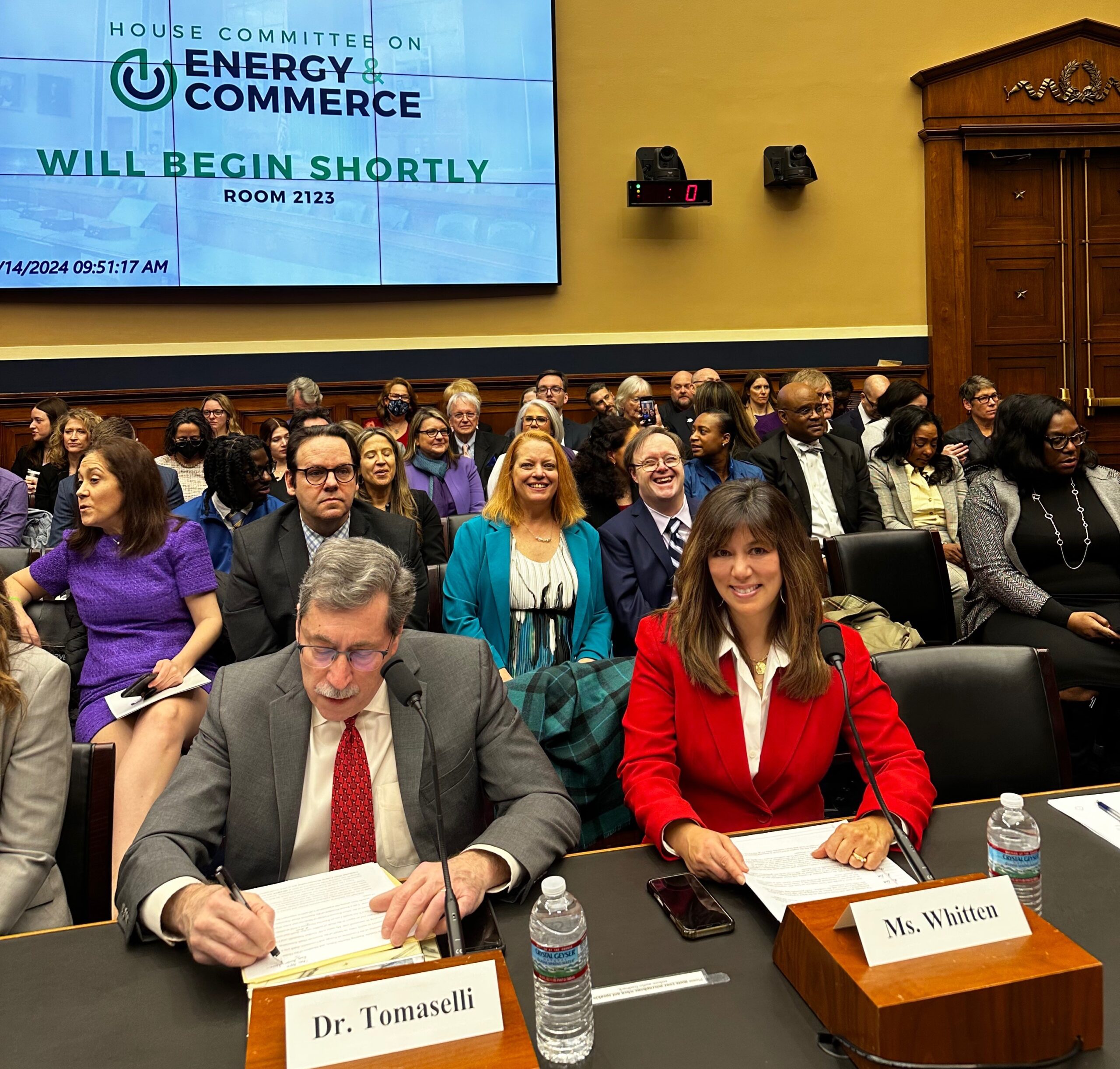
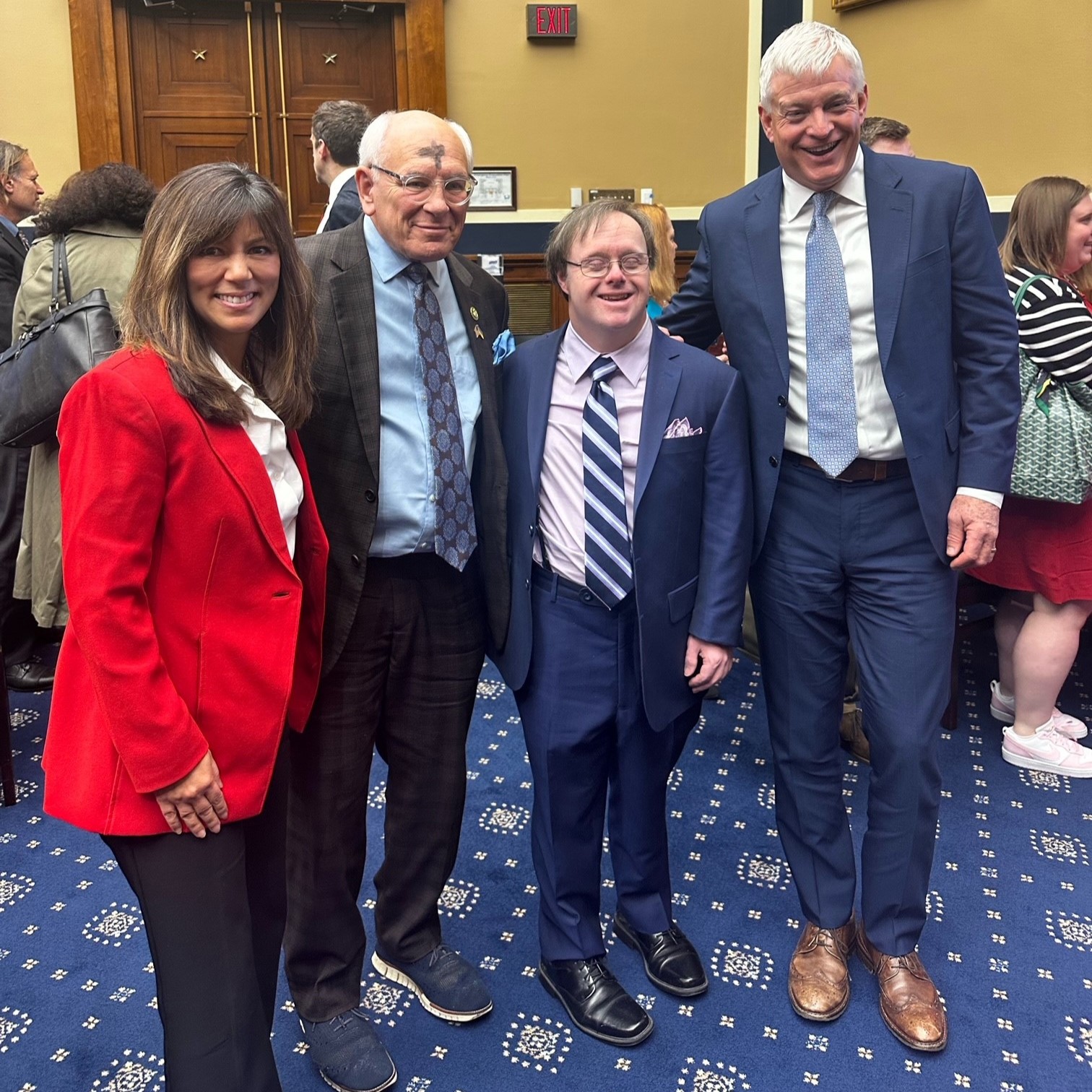
2024 House Committee on Energy & Commerce Health Hearing: “Legislative Proposals To Support Patients And Caregivers
GLOBAL will be launching a digital campaign this week to encourage supporters to contact their Representatives, tell their personal stories, and let them know that passing this bill this year is imperative and important Visit www.globaldownsyndrome.org/advocacy for more information.
“Working with Congresswoman Cathy McMorris Rodgers has been one of the greatest honors of my life,” says Michelle Sie Whitten, GLOBAL President & CEO. “With this bill, named in memory of our beloved Ambassador DeOndra Dixon, Congresswoman McMorris Rodgers is helping to create a powerful future for a population that has been largely ignored and neglected. With her unwavering commitment and leadership, and with wonderful bipartisan support, our champions are ensuring the INCLUDE Project and Down syndrome research funding remains a national priority and that we will see increased lifespan and improved health as a result.”
Having advocated for the establishment of INCLUDE, GLOBAL continues to advocate for additional funding and programs that would help some of the most vulnerable populations within the Down syndrome community: including those living in rural America, Black or African Americans with Down syndrome and other minorities. There is some research that points to a significant disparity in lifespan for Black or African Americans with Down syndrome as compared to a Caucasian with Down syndrome.
The INCLUDE Project was established via congressional directive in 2018 after a seminal first-in-kind House Appropriations Labor, Health and Human Services, and Education Subcommittee hearing led by then-Chairman Cole Tom Cole and Ranking Member Rosa DeLauro. Congresswoman McMorris Rodgers was a key supporter at the hearing and testified along with Crnic Institute for Down Syndrome Executive Director, Dr. Joaquín Espinosa, and GLOBAL Board Member and self-advocate, Frank Stephens. Frank’s testimony that day, which included the famous phrase, “I am a man with Down syndrome and my life’s worth living,” went viral to 1 million views that day and today stands at well over 200 million.
Dr. Espinosa’s testimony focused on the fact that people with Down syndrome have a very different disease profile whereby they are highly predisposed to certain diseases (for example Alzheimer’s and certain autoimmune diseases) and highly protected from others (for example solid tumors). He also presented his groundbreaking study that categorizes Down syndrome as an immune system disorder and how by studying people with Down syndrome we can not only improve their lives but the lives of millions of others who suffer from diseases.
Before Congress began funding the NIH INCLUDE Project, Down syndrome was one of the least funded genetic conditions by the NIH despite being the leading cause of developmental delay in the U.S. and around the world. For nearly two decades the funding had languished between $16 million and $20 million even during years when there was a double-digit growth of the NIH budget. In 2023, the estimated INCLUDE budget is $144 million. GLOBAL’s advocacy goal is to increase funding to over $250 million a year.
GLOBAL Affiliate, the Crnic Institute for Down Syndrome, has five clinical trials specifically for patients with Down syndrome: Two in Alzheimer’s and Down Syndrome, one in Down Syndrome Regression Disorder, and two in autoimmunity and inflammation.
To read about the impactful research that the INCLUDE Project has funded visit the NIH Down Syndrome Coordinating Center Website at: https://includedcc.org/.
###
About Global Down Syndrome Foundation
The Global Down Syndrome Foundation (GLOBAL) is the largest non-profit in the U.S. working to save lives and dramatically improve health outcomes for people with Down syndrome. GLOBAL has donated more than $32 million to establish the first Down syndrome research institute supporting over 400 scientists and over 2,200 patients with Down syndrome from 33 states and 10 countries. Working closely with Congress and the National Institutes of Health, GLOBAL is the lead advocacy organization in the U.S. for Down syndrome research and care. GLOBAL has a membership of over 100 Down syndrome organizations worldwide, and is part of a network of Affiliates – the Crnic Institute for Down Syndrome, the Sie Center for Down Syndrome, and the University of Colorado Alzheimer’s and Cognition Center – all on the Anschutz Medical Campus.
GLOBAL’s widely circulated medical publications include Global Medical Care Guidelines for Adults with Down Syndrome, Prenatal & Newborn Down Syndrome Information and the award-winning magazine Down Syndrome WorldTM . GLOBAL also organizes the annual AcceptAbility Gala in Washington DC, and the annual Be Beautiful Be Yourself Fashion Show, the largest Down syndrome fundraiser in the world. Visit globaldownsyndrome.org and follow us on social media (Facebook & Twitter: @GDSFoundation, Instagram: @globaldownsyndrome).
February 29th, 2024 by Cole Wilkes
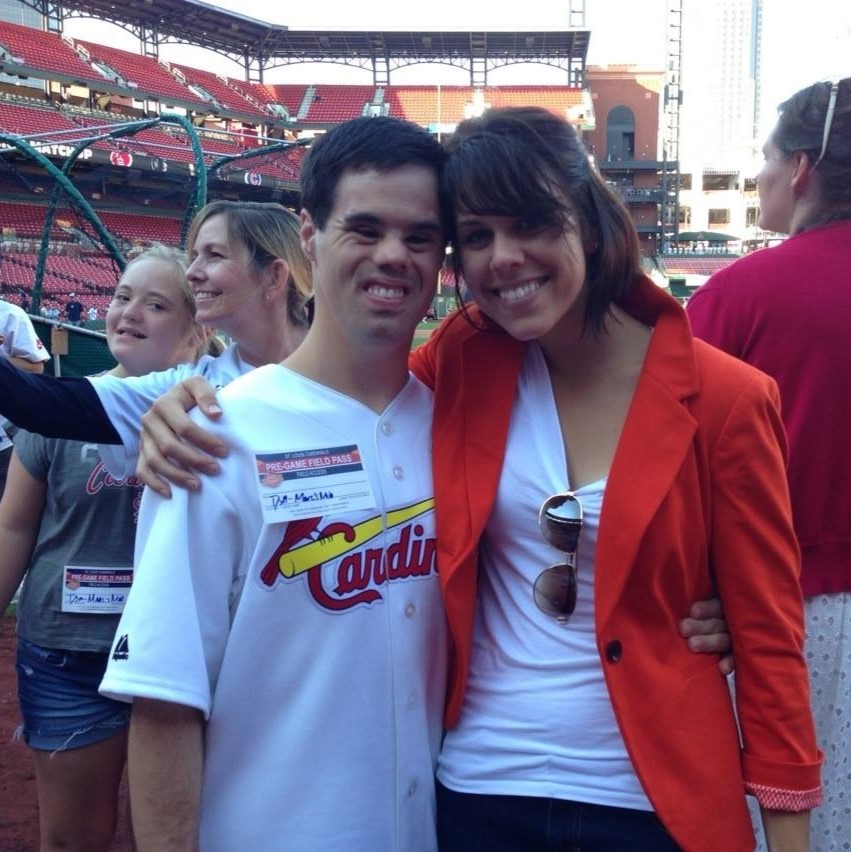 Under Erin Suelmann’s leadership, the Down Syndrome Association of Greater St. Louis (DSAGSL) has become one of the largest local Down syndrome organizations in the United States. In 2023 the organization raised over $1 million in support of over 2,000 families and expanded their impactful programs and services. Erin and her team have maintained an A+ rating from the Better Business Bureau and met all 20 BBB Charity Accountability Standards. A strong believer in financial transparency, DSAGSL invites you to view their latest Annual Report and see exactly how their sponsorship of the GLOBAL Medical Care Guidelines for Adults with Down Syndrome fits into their tight yet highly effective budget.
Under Erin Suelmann’s leadership, the Down Syndrome Association of Greater St. Louis (DSAGSL) has become one of the largest local Down syndrome organizations in the United States. In 2023 the organization raised over $1 million in support of over 2,000 families and expanded their impactful programs and services. Erin and her team have maintained an A+ rating from the Better Business Bureau and met all 20 BBB Charity Accountability Standards. A strong believer in financial transparency, DSAGSL invites you to view their latest Annual Report and see exactly how their sponsorship of the GLOBAL Medical Care Guidelines for Adults with Down Syndrome fits into their tight yet highly effective budget.
Recently, GLOBAL’s Vice President of Strategic Alliances, David Tolleson, caught up with Erin for an exclusive interview about the importance of the GLOBAL Adult Guideline, how having a brother with Down syndrome shaped her life, and her advice and hopes for healthcare support for all individuals with Down syndrome.
DAVID: Your group supported the first edition of the GLOBAL Medical Care Guidelines for Adults with Down Syndrome (GLOBAL Adult Guidelines). Why is supporting the second edition of the guideline with a multi-year pledge important to you and your board?
ERIN: I have an adult brother with Down syndrome, who’s 37. I’ve known people with Down syndrome my whole life and I’ve watched them age. That, in conjunction with being the leader of a Down syndrome association, I have witnessed first-hand the challenges that the healthcare system faces and that families face in finding good, reliable, competent care for people with Down syndrome, especially adults. So, to me it’s a “no brainer” to invest in research and tools that will improve healthcare for adults with Down syndrome and bring awareness of the importance of funding that helps everyone.
We had discussions on my board about how our investment in the GLOBAL Adult Guideline directly impacts people in St. Louis and we said it positively affects people with Down syndrome everywhere. It’s a tangible tool we can use right here in St. Louis to improve healthcare for adults with Down syndrome. I’m really grateful that GLOBAL is doing the work and leading the way in doing the work because I don’t know who else would do it—otherwise it just wouldn’t get done. It’s absolutely a priority for us.
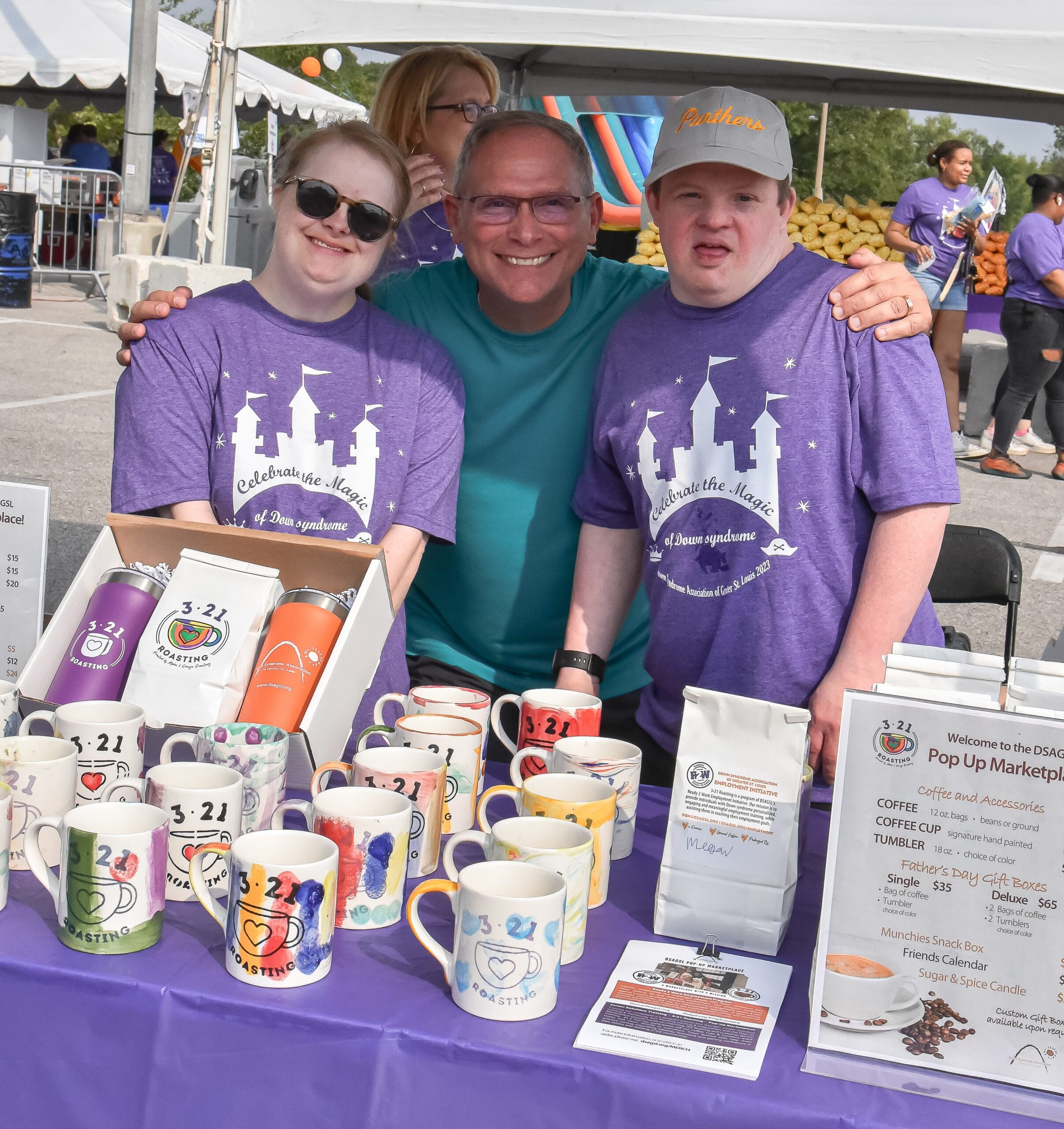
DAVID: DSAGSL is very strict about how you use your money. How does giving to the GLOBAL Adult Guideline fit into your criteria?
ERIN: Our mission is to serve, support and celebrate the lives of individuals with Down syndrome and their families through every stage of life. We believe that healthcare is essential in ensuring that people with Down syndrome can live long lives and fulfill their potential. We don’t have capacity to do what GLOBAL is doing in terms of creating the healthcare guidelines—I wouldn’t even know where to begin! We really believe in doing what we do well and partnering with and supporting agencies that are doing what they do well. GLOBAL has definitely shown that it is really good at advocating for healthcare for people with Down syndrome, which directly impacts the people we serve, so by supporting GLOBAL we’re improving healthcare for them. The GLOBAL Adult Guidelines don’t just support people in Colorado or Denver, they support people across the globe.
DAVID: You mentioned your brother. How does being a sibling impact your work?
ERIN: Oh gosh, I am who I am because of my brother. From a really early age I was cheering for the underdog and I was recognizing injustices, inequalities, and inequities. I was taking notes of how people with disabilities were being treated. I also developed a lot of patience because I have a brother with a disability. I have a lot of core memories of experiences that made me who I am. So, I take that to work with me every day and I feel really honored that I get to work in a field where I get to try to make a better world for people with Down syndrome. Whether it’s advocacy, creating programs where they are learning skills, or raising awareness about Down syndrome, everything that I do day-to-day has been impacted living with him and the great lessons he’s taught me. I’m blessed to be able to make a difference.
DAVID: How is the GLOBAL Adult Guideline making a difference in St. Louis?
ERIN: We use the Guidelines in our “Ages and Stages” packet. A few years ago, we realized families call us when they need something right away, so we thought a great way to help them would be to send them information before they need it—whether it be potty training, behavior in school, puberty, and so on—so we send out these packets at key milestones in life. The goal is that the family has the information they need before a crisis moment. We send out the GLOBAL Adult Guideline in our “16 Turning 17” packet, so all the families with a child turning 17 get that information. It helps them prepare and be better advocates for their loved ones. It helps people with Down syndrome be better advocates for themselves in the healthcare setting.
We’ve done some webinars with GLOBAL and we share GLOBAL Webinars. The GLOBAL Webinars attract the leading medical experts and are real tools that we give to people to improve healthcare for their child with Down syndrome or for themselves. In addition, last year we sent packets to healthcare professionals—something we plan to continue—in an effort to empower them to better serve people with Down syndrome. We sent the GLOBAL Adult Guideline to medical professionals along with a magnet talking about how they can get more information from our website. So, the guidelines are really directly impacting people in St. Louis.
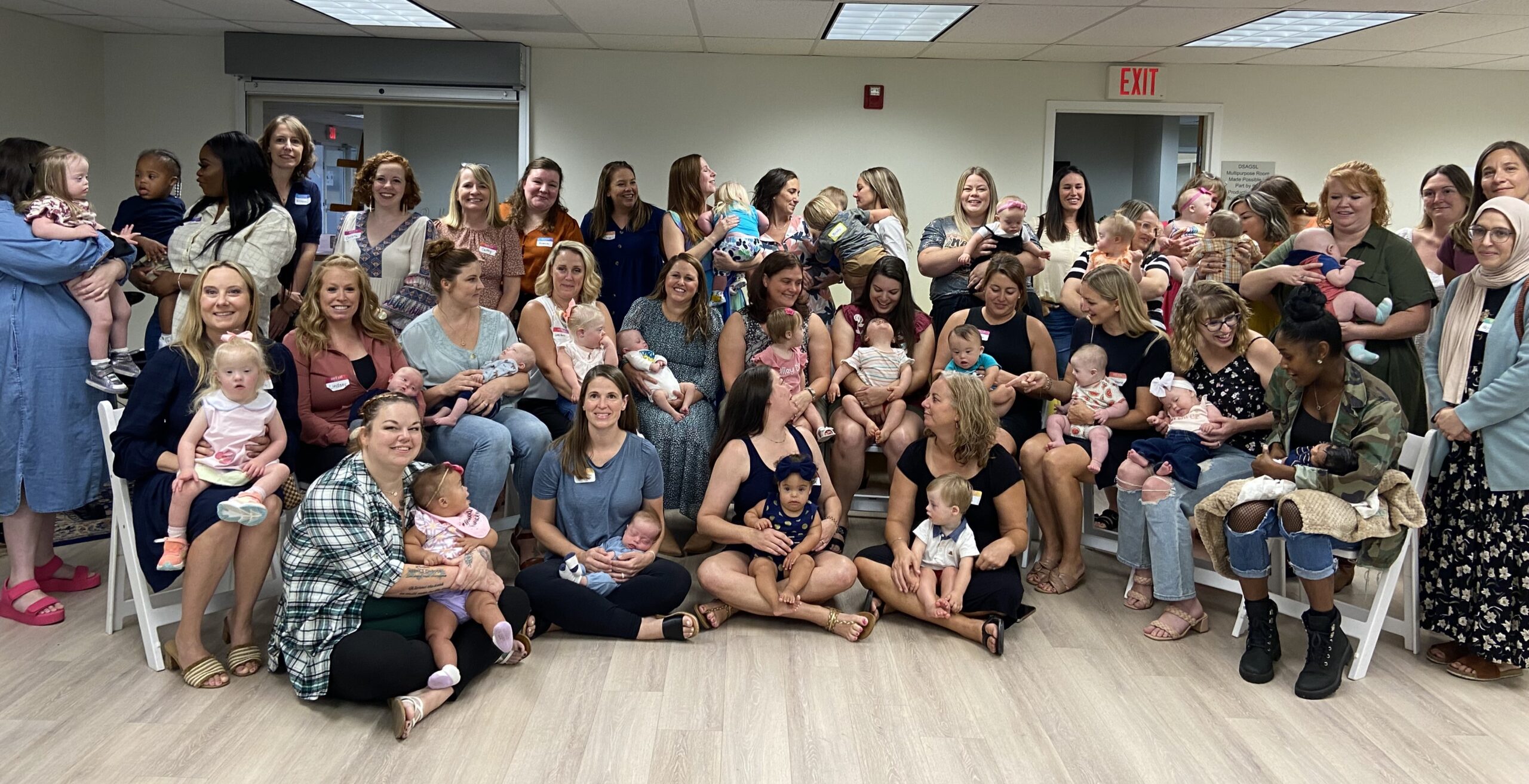
DAVID: How does GLOBAL’s advocacy, research, and medical care work make a difference to families in your community?
ERIN: We can do what we can on a local level. We have access to local, county, and state leaders to improve the lives of people with Down syndrome, but I don’t have the capacity as one person to go to the National Institutes of Health (NIH) to advocate for improved healthcare or improved funding of research. Nor is that the best use of my time—my time is about serving people in St. Louis. It’s important that organizations like GLOBAL exist to do that work. It’s good that Michelle, you and the GLOBAL team are at the NIH advocating, because you have the expertise and the access to professionals and the experts, and that is GLOBAL’s mission. That leaves me able to focus on the people in my region and rest assured that that federal advocacy work is taking place through an organization that is really equipped to do that work well. I would not be able to do it, so I’m really grateful to GLOBAL that you’ve made that your mission and that you’re doing it really well, taking it very seriously, and having the experts behind you.
DAVID: Do you have any advice for adults navigating the healthcare system?
ERIN: I think my advice would be that you have to come equipped with the knowledge and, in many cases, you have to educate your doctor, which is not the way that it should be. Hopefully, organizations like DSAGSL and GLOBAL can continue to help educate healthcare professionals, but for right now—especially if you live in rural communities or communities that don’t have a Down syndrome center or research university, you really do have to take it upon yourself. You have to arm yourself with the knowledge, best practices and things like the GLOBAL Adult Guideline, because your physician can’t always know everything. It’s also about finding a doctor who will listen to you. If you feel like your doctor is not taking you seriously and they’re not willing to listen to you and/or go the extra mile to learn outside of that 15-minute visit, then you have the wrong doctor and you need to find a better one. It should be a partnership. Even if they don’t know everything, they should be willing to learn, take you seriously and read the materials you bring them.
I also think that finding community through your Down syndrome association, connecting with other individuals with Down syndrome and their families, so you can share resources and recommendations on doctors, would be my advice. That’s also true for any kind of specialty care. We really have to advocate for ourselves.
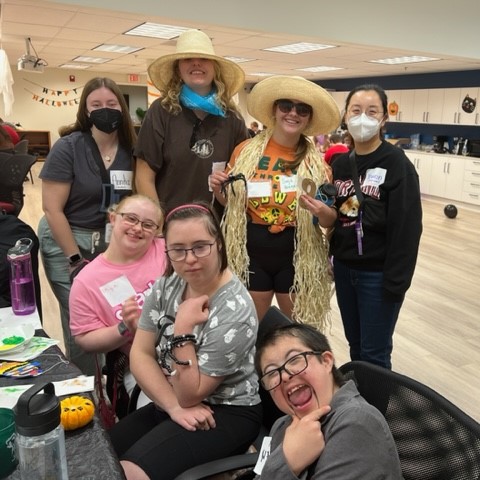
DAVID: What are your hopes for the future in healthcare?
ERIN: I think if I had to envision a perfect world as far as healthcare and Down syndrome are concerned, my goal would be that every physician would know about Down syndrome and would have gotten more education about it in medical school. We hear from doctors that they get 15 minutes to an hour during their entire medical training about Down syndrome, which needs to change because there are going to be more and more people living with Down syndrome. It’s not an uncommon condition, so why shouldn’t doctors know about it and have that be a part of their regular curriculum in medical school? A family shouldn’t have to go into a doctor’s visit and be an interface with a physician who has never learned about Down syndrome or even seen anybody with Down syndrome. That’s why in St. Louis I say our goal should be that everybody knows somebody with Down syndrome.
Every doctor should have the opportunity to meet someone with Down syndrome because then that diagnosis delivery will be better. It won’t be so heart-wrenching for families when they receive the diagnosis. Families won’t be discouraged, because they won’t have to go into a medical visit where the doctor doesn’t want to listen. Normalizing Down syndrome in the medical community means there can be more equitable care. We have a lot of work to do at the intersection of minorities and disabilities. The medical community needs to do better in treating people in traditionally underserved groups and in rural communities and that’s just magnified by someone having a disability. So, there’s a lot of work to be done.
DAVID: We’re very grateful for your time and for your support of GLOBAL’s work. Is there anything else you would like to share with our readers?
ERIN: It’s really exciting that we’re going to be celebrating our 50th anniversary in 2026!
DAVID: That’s wonderful!
ERIN: Yes, we have some really exciting things planned! Our success comes from our partnership and collaboration with other Down syndrome associations and national groups as well. The more we can support each other, the more we can lean on each other for the expertise that one another bring to the table or rely on someone who does something really well, like GLOBAL and the Adult Guideline, we’re all going to more successful as a result.
I really appreciate the national groups like GLOBAL and DSAIA that allow us to share, communicate and collaborate. I’ve learned so much from other organizations like yours and so many others across the country. I’m excited that GLOBAL is doing this piece on the local affiliates because there are a lot of really good associations across the country doing exciting work and making the world a better place!
February 28th, 2024 by Cole Wilkes
DeOndra Dixon INCLUDE Act, World Down Syndrome Day, Jordin Sparks, Erin Suelmann, Day on the Hill & More – Your February Newsletter!